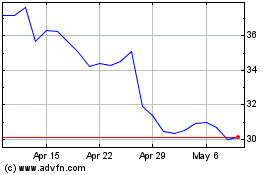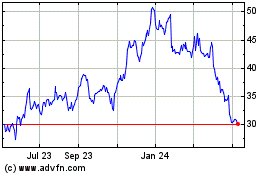Mobileye Ends Partnership With Tesla
July 26 2016 - 3:20PM
Dow Jones News
Auto-safety supplier Mobileye N.V., is ending its supply
agreement with Tesla Motors Inc. following a high-profile traffic
fatality in May that has been connected to semi-autonomous
technology it sold to the Silicon Valley electric-vehicle
maker.
Mobileye supplies camera-based advanced driver-assistance safety
systems that help a vehicle steer or follow behind another car or
brake on its own. The Israeli company has agreements with more than
a dozen auto makers, but its relationship with Tesla had initially
helped bring it to the attention of auto analysts and Wall Street.
General Motors Co., Nissan Motor Co., BMW AG and Hyundai Motor
Group make up more than 60% of its sales.
Mobileye will no longer provide computer chips and algorithms to
Tesla beyond the current product cycle due to apparent
disagreements about how the technology was deployed in the auto
maker's "autopilot" system. It is unclear when the contract ends,
but a new Mobileye system—called the EyeQ4—comes out in 2018.
The friction between Mobileye and Tesla reflects the tension
between suppliers that bring cutting-edge technology to the auto
industry and the makers they serve. Unlike agreements for
more-conventional parts, such as steering wheels, a growing number
of tech suppliers demand more control over how the technology is
used in the automobiles it goes into.
Mobileye shares fell 7.9% to $45.41 in New York Stock Exchange
trading on Tuesday. The stock has increased 27% over the past three
months, but that is not enough to offset the 18% decline
experienced over the past year.
Mobileye said Tesla would account for about 1% of its revenue in
2016. The company said Tuesday it had $26.9 million in net income
in the second quarter on revenue of $83.5 million—a 32% net
margin.
Speaking to analysts after the report on second-quarter
earnings, Mobileye Chief Technical Officer Amnon Shashua indicated
that the accident in May led to the ending of the relationship with
Tesla. That crash has triggered an initial probe by the National
Highway Traffic Safety Administration and wider scrutiny of
semiautonomous-vehicle technology.
"I think in a partnership, we need to be there on all aspects of
how the technology is being used, and not simply providing
technology and not being in control of how it is being used," he
said.
Mobileye said it would support and maintain the current Tesla
Autopilot product plans. These include upgrading a vehicle's
ability to avoid crashes and optimizing auto-steering without
hardware improvements, the company said. Tesla declined to comment
on Mobileye's disclosure.
Mobileye makes algorithms and computer chips to interpret images
in order to anticipate potential collisions with other vehicles,
pedestrians, cyclists, animals, debris and other obstacles.
Mobileye said it would concentrate on systems that lead to full
autonomy rather than systems that take partial control from
drivers.
Earlier this month Mobileye announced a partnership with BMW and
Intel Corp. to design a system for fully autonomous vehicles by
2021. Mobileye has said it has contracts to ship systems that allow
for full autonomy to two auto makers by 2019, but hasn't named the
companies.
For Tesla, the Mobileye system is used to power its Autopilot,
which adds steering through curves, along with adaptive cruise
control that could free up a driver's hands and feet. The system,
however, is intended to have the driver with his hands on the wheel
at all times.
U.S. federal safety regulators are investigating the system
after a man died in May when his Tesla Model S hit a truck that was
turning in front of him. The Autopilot system was engaged, but it
didn't slow the car before it struck the tractor trailer. Tesla
said the driver never hit the brakes before striking the truck.
"It's very important given this accident…that companies would be
very transparent about the limitations" of autonomous driving
systems, Mr. Shashua, Mobileye's technical officer, said at a joint
news conference with BMW and Intel earlier this month. "It's not
enough to tell the driver to be alert but to tell the driver why,"
he said.
Tesla said the system failed to distinguish the trailer—which
was white—from the bright sky. Mobileye said the system wasn't
designed to handle such turns and a new system, the EyeQ4, would be
able to detect and respond to such a maneuver.
Write to Mike Ramsey at michael.ramsey@wsj.com
(END) Dow Jones Newswires
July 26, 2016 15:05 ET (19:05 GMT)
Copyright (c) 2016 Dow Jones & Company, Inc.
Intel (NASDAQ:INTC)
Historical Stock Chart
From Mar 2024 to Apr 2024

Intel (NASDAQ:INTC)
Historical Stock Chart
From Apr 2023 to Apr 2024
